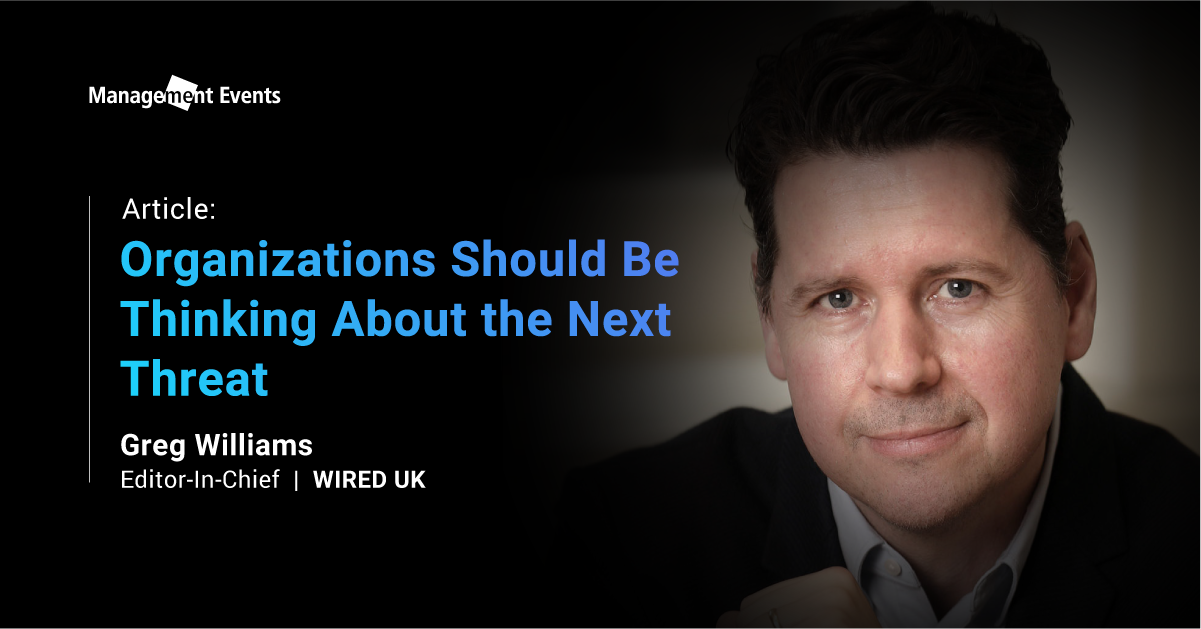< Back to insights
Published 26. Apr. 2021
Greg Williams, Editor-in-Chief of WIRED UK: "Organizations Should Be Thinking About the Next Threat"
Greg Williams shares his insights on scenario planning strategies, agility and innovation to help organizations weather any storm.
What is the biggest lesson your organization has learnt from the past year?
If the answer is that businesses must be prepared for anything, you are not alone.
Research by McKinsey & Company revealed that agile organizations respond faster to crises. Therefore, creating an agile business culture should be high on every C-level’s list of priorities.
It is time for leaders to relearn and revamp business strategies, build flexible facets within teams and make full use of new technologies. This begs the question: Is your organization prepared to tackle unprecedented changes and tech-related challenges?
We speak to Greg Williams, editor-in-chief of WIRED UK and thought leader on future-shaping ideas, trends and technologies; for his take on what organizations should look out for in 2021 and beyond.

New Technologies and Opportunities
Technology, both a blessing and a curse of the 21st century, perpetually churns out new developments that businesses are struggling to catch up with. Industries are technology-saturated, resulting in overwhelmed leadership teams and employees.
Williams cuts through the noise and highlights several key trends that will impact companies in the next few years:
“AI will continue to be embedded throughout the organizational value chain, offering new insights and helping enterprises make better decisions.“
By leveraging data and artificial intelligence (AI), companies can improve all stages of their CX journey. For example, Amazon used AI and predictive analytics, before the browsing prospects even made a purchase, to unify data from customers, understand their patterns, predict their next step and recommend products based on their interests.
Williams also stressed “the decarbonization of economies as automotive becomes electrified, cities become smarter and investors divest from fossil fuels.”
The World Business Council for Sustainable Development supports Williams’ sentiment, stating that sustained decarbonization is the most effective way to manage climate change. Group CFO of Storebrand, Lars Aasulv Løddesøl, recommends adopting sustainable efforts to ensure long-term financial returns and that it is ultimately “the right thing to do” for any organization.
Williams states there will be “new forms of automation and we’ll see an opportunity for home technologies” as people spend money on their living environments and on local services.” Home applications with embedded AI and automation features promise both advanced technological appliances and security. Trending home technologies include video door alarms, remote-controlled locks and ultra-modern burglar alarms.
In addition, 2020 saw “the end of education as we know it, with learning moving online.” However, Williams feels that the social aspects of learning are hard to replicate in a virtual environment.
A Whole New Automated World
Williams predicts that “back-office technologies such as RPA and AI-centric customer service will continue to deliver value, as will cloud.”
PwC estimates that 45% of work activities can be automated with the help of RPA, saving $2 trillion in global workforce costs. The automation of repetitive processes will free up valuable time for managers and employees involved in finance and accounting, HR administration and claims processing, among others.
Chatbots, the face of AI-centric customer service, have eased the workload of human support teams across industries by addressing common requests and filtering genuine enquiries. This will create “a shift away from keyboards as new interfaces begin to have applications both for consumer products and for enterprise,” Williams commented.
The relevance of cloud technology is undeniable. Microsoft Azure, Amazon Web Services and Google Cloud are three of the most popular cloud platforms in the market, and interviewed CIOs in our Executive Trend Survey are contemplating between the cloud computing services while some are even working with all three of the platforms.
There is no choice but for organizations to accept and embrace “the gradual presence of automation in the physical world as well as the business operations functions we’re already seeing,” Williams says.
Into the Unknown
Post-COVID, the immediate priority for decision makers should be ensuring their digital strategy facilitates effective scenario planning.
So, what scenario planning strategies should businesses implement? It all boils down to looking ahead and being prepared. Williams strongly suggests all digital strategies should have an “in-built notion of constant uncertainty” moving forward.
‘‘The cadence of regular audits of preparedness should now be increased in order to enable organizations to become more fluid and be able to deliver new products and always attune to client and customer needs,” Williams added.
Even though the climate crisis may seem like a distant issue to many organizations, Williams states “their impacts will be felt throughout society unless urgent action is taken.” Fortunately, some progress has been made with heavy-emitting industries, including BP, Shell, Daimler, and Rio Tinto, taking on more green initiatives through the COVID-19 outbreak.
Big players in finance and investment are also taking steps to combat climate change. BlackRock, asset manager giant, has pledged to penalize directors of companies that fail to manage environmental risks.
However, Williams believes that ”we still need some significant technological breakthroughs in areas such as green steel and green concrete.”
Here’s a staggering statistic: steel production makes up 7% to 10% of total carbon emissions — twice the amount from air travel. According to a recent study by McKinsey & Company, approximately 14 percent of steel companies’ potential value is at risk if their environmental impact remains unchanged.
German steelmaker, Salzgitter, is already aware of that risk and will be increasing green steel production to a “five-figure” volume this year with increasing demand from the automotive industry and white goods sector.
Williams says, “all organizations should be thinking about the next threat.”
Organizations that proactively revise and improve business practices with this mindset stand a better chance of surviving unforeseen obstacles – be it a global pandemic, economic collapse or climate crisis.
